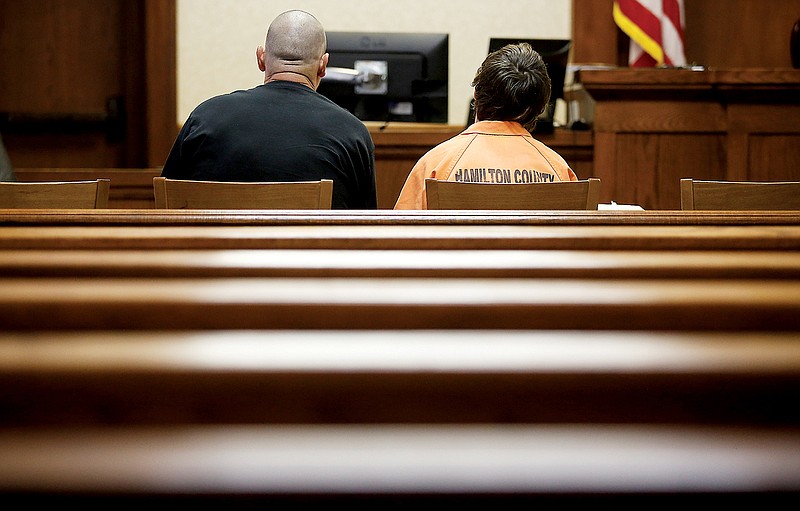States across the nation have spent the last 15 years slashing the number of juveniles in state-run justice facilities, either by sending them instead to local or county programs or by closing state facilities altogether.
Between 1997 and 2011, Tennessee cut the number of juveniles in state-run institutions by about 70 percent, according to the Council of State Governments. And while no state study has yet shown what that could mean for Hamilton County, the results of a Texas-based study released by the council's Justice Center present one picture of the way reforms could play out.
In 2012, a state-run facility in Shelby County, Tenn., faced a scathing federal audit that revealed inequality and abuse. State and county leaders worked to overhaul the system and implement reforms, but riots and break-outs at a Nashville facility just last September revealed continuing unrest. Meanwhile, incidents such as the recent stabbing of a 13-year-old boy by his 12-year-old female classmate at Lookout Valley Middle School serve as a reminder of the local impact of the problem.
Mark Soler, executive director for the Center for Children's Law and Policy, said the study seems to be one of the largest and best ever conducted. Soler said the study shows "it's not necessary to lock so many kids up in juvenile corrections facilities. They can be handled faithfully in community supervision without endangering the public."
Like Tennessee, Texas' state-run juvenile justice facilities came under fire after reports that children remanded to state custody had suffered a number of abuses. In the wake of those reports, Texas legislators worked to reform the state's system, and over the course of seven years closed juvenile correction facilities and reduced the number of juveniles in state-run facilities by 66 percent while infusing juvenile probation departments with millions of dollars in state funds.
The result was more youth placed in local or county facilities, and a 21 percent drop in the number who re-offended. Youth who had previously been committed to state-run facilities did better in programs that were closer to home, as well.
Soler pointed out the study also seems to prove that locking kids up doesn't seem to reduce juvenile crime or make communities any safer.
Lurone "Coach" Jennings, administrator of Chattanooga's Center for Youth and Family Development, said local programs like those he oversees can produce results.
"We've seen some tremendous turnaround from many of those kids," he said.
Jennings said wraparound services that provide education and job opportunities seem to be key. Programs close to home can be beneficial if they're effective in getting parents to make positive changes as well, Jennings said.
"It's hard to go back when they see so much opportunity that we provide for them," he said.
However, the study's authors found that the type of community-based program in which youth were placed didn't much matter. In fact, rearrest rates didn't seem to be lower for those who were in a local facility and enrolled in, say, a skills-based program than for those who weren't in any program at all.
But Hamilton County Juvenile Court Judge Rob Philyaw said state-run facilities, too, can have a positive impact on youth who are sent there. Philyaw said he's seen amazing results from young people he's sent to Mountain View Youth Development Center in Dandridge, Tenn.
Philyaw said the East Tennessee facility more closely resembles a high school than a prison, and he noted that some young people have said they prefer life there to living in a unstable or unsupportive home.
"Sometimes I think, 'I wish I could send more,' because I know what they can do," Philyaw said of the facility.
Philyaw said he wishes there were more local residential programs for youth.
General Assembly Majority Leader Sen. Mark Norris, R-Collierville, a former Council of State Governments chairman, represents Shelby County, where state reforms are being implemented in the wake of that federal audit. Norris said he hopes the Texas study will highlight areas of improvement in Tennessee. He said he is working to understand the current climate and reforms of the last few years in an effort to determine how tax dollars might best be advocated. But he said he's missing one key piece: more data.
Researchers who conducted the study chose Texas because of its abundance of records, and recommended states with similar profiles, like Tennessee, make an effort to compile the same information.
Norris said Tennessee is one of five states whose implementation of Council of State Government recommendations will be tracked over the next several years.
"The biggest takeaway is that we need to do a better job in Tennessee of gathering that data in the first instance," Norris said.
Contact staff writer Claire Wiseman at cwiseman@timesfreepress.com or 423-757-6347. Follow her on Twitter @clairelwiseman.

